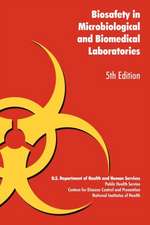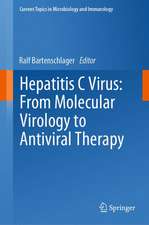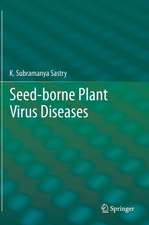Helicobacter pylori
Editat de Nayoung Kimen Limba Engleză Hardback – 27 oct 2016
| Toate formatele și edițiile | Preț | Express |
|---|---|---|
| Paperback (1) | 1027.18 lei 38-44 zile | |
| Springer Nature Singapore – 9 dec 2018 | 1027.18 lei 38-44 zile | |
| Hardback (2) | 1466.92 lei 38-44 zile | |
| Springer Nature Singapore – mar 2024 | 1652.52 lei 3-5 săpt. | |
| Springer Nature Singapore – 27 oct 2016 | 1466.92 lei 38-44 zile |
Preț: 1466.92 lei
Preț vechi: 1544.13 lei
-5% Nou
Puncte Express: 2200
Preț estimativ în valută:
280.68€ • 293.09$ • 231.79£
280.68€ • 293.09$ • 231.79£
Carte tipărită la comandă
Livrare economică 11-17 aprilie
Preluare comenzi: 021 569.72.76
Specificații
ISBN-13: 9789812877055
ISBN-10: 9812877053
Pagini: 600
Ilustrații: X, 556 p. 114 illus., 103 illus. in color.
Dimensiuni: 178 x 254 x 36 mm
Greutate: 1.52 kg
Ediția:2016
Editura: Springer Nature Singapore
Colecția Springer
Locul publicării:Singapore, Singapore
ISBN-10: 9812877053
Pagini: 600
Ilustrații: X, 556 p. 114 illus., 103 illus. in color.
Dimensiuni: 178 x 254 x 36 mm
Greutate: 1.52 kg
Ediția:2016
Editura: Springer Nature Singapore
Colecția Springer
Locul publicării:Singapore, Singapore
Public țintă
Professional/practitionerCuprins
Part 1. Epidemiology-Prevalence andTransmission routes of H. pylori.- Part 2. Pathophysiology.- 1) Colonization ofH. pylori in the stomach.- 2) Brief description of Pathophysiology.- 3) Immunemechanism.- 4) Change of acid secretion, ghrelin and leptin by H. pylori.- 5) H.pylori virulence factors.- A: toxin (CagA, VacA, DupA, OipA, IceA).- B: geneticpolymorphism of toxin and disease.- 6) Host factors: genetic polymorphism,etc.- Part 3. Diagnosis.- 1) Serology.- 2) Histology.- 3) Culture.- 4) UBT.- 5)Stool antigen.- 6) Specific conditions.- A: Children.- B: Bleeding.- Part4. Symptom.- 1)Symptom of acute and chronic H. pylori infection.- Part 5.Disease.- 1) Atrophic gastritis and Intestinal metaplasia.- 2) Functional dyspepsia.-3) Peptic ulcer.- 4) MALToma.- 5) Gastric cancer.- A: Synopsis and Epidemiologyof gastric cancer.- B1: Pathogenesis: i.Genetic alternation (mutations intumor-related genes) induced by Activation-induced cytidine deaminase (AID).- B2:Pathogenesis: ii. Epigenetic mechanisms: aberrant DNA methylation, microRNA.- B3:Pathogenesis:iii. Macrophage inhibitory factor (MIF).- B4: Pathogenesis: iv.Epidermal mesenchyme transition (EMT).- B5: Pathogenesis: v. ABO blood type.- B6:Pathogenesis: vi. First relatives of gastric cancer.- C: H. pylori-negativegastric cancer.- 6) Gastroesophageal reflux disease (GERD).- 7) NSAID-inducedgastropathy and H. pylori infection.- 8) Extraintestinal manifestations of H.pylori infection.- A: Iron deficiency anemia.- B: Idiopathic thrombocytopenicpurpura.- C: Heart disease.- D: Atopy and allergy.- Part 6. Antibioticresistance.- 1) Synopsis of antibiotic resistance.- 2) Clarithromycin.- 3)Amoxicillin.- 4) Quinolone.- 5) Metronidazole.- Part 7. Treatment.- 1) Synopsisof antibiotic treatment.- 2) Triple therapy.- 3) Quadruple therapy.- 4)Sequential therapy.- 5) Concomitant therapy.- 6) Tailored therapy based onantibiotic resistance.- 7) Levofloxacin or rifabutin based triple therapy.- 8)Probiotics.- 9) Treatment guidelines.- 10) Screening method of early gastriccancer.- 11) Recrudescence and reinfection.- Part 8. Consequences of H.pylori eradication.- 1) Peptic ulcer disease.- 2) atrophic gastritis andIntestinal metaplasia.- 3) Gastric cancer.- Part 9. The effect of H. pylori onthe other microbiota of stomach.- The effect of H. pylori on the othermicrobiota of stomach.- Part 10. Animal model- H. pylori, H. felis.
Notă biografică
Nayoung Kim MD Ph.D., Department of Internal Medicine, Seoul National University College of Medicine, Seoul National University Bundang Hospital, Republic of Korea
Textul de pe ultima copertă
This book presents thecurrent state of knowledge regarding the ability of Helicobacter pylori to colonize the gastrointestinal tract, theglobal epidemiology of H. pyloriinfection, transmission routes, the pathophysiology of H. pylori-related gastroduodenal and other diseases, diagnosis andtreatment methods, guidelines for eradication, antibiotic resistance, thereinfection rate after H. pylori eradication,and animal models of H. pylori orrelated Helicobacter infection. Theaim is to equip readers around the world with the understanding required inorder to implement effective methods of H.pylori eradication and to enhance clinical outcomes for patients. The textis clearly written and is complemented by many helpful illustrations. This bookwill be a great asset in clinical practice for all practitioners who areinvolved in caring for patients with H.pylori-related diseases or have an interest in the subject. It will also bea useful source of information for medical students and for intelligent laypeopleseeking information on H. pylori.
Caracteristici
Presents the latest knowledge on all aspects of H. pylori infection and its consequences Offers detailed guidance on diagnosis and treatment Covers epidemiology, pathophysiology, antibiotic resistance, and reinfection rates





